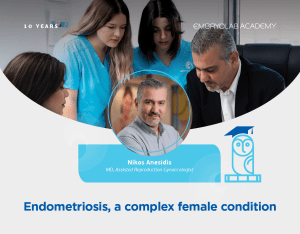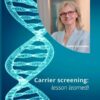
by Nikos Anesidis, MD, Assisted Reproduction Gynecologist
Ever since its microscopic unveiling in 1860 and despite numerous medical studies and reports, endometriosis remains to this day one of the most perplexing and enigmatic gynecological diseases. In simple terms, endometriosis is a chronic and progressive condition where endometrial cells normally found inside the uterus have lodged in other parts of the body. This, not so rare, problem affects mostly women of reproductive age and one of the most common signs of endometriosis is infertility. However, Endometriosis is a debilitating condition, posing significant quality-of-life issues for the woman and can affect areas such as work, family relationships and self-esteem.
The mechanisms of infertility associated with endometriosis remain controversial and include impaired oocyte development, increased oxidative stress, altered immune function and hormonal environment in the follicular and peritoneal milieu, and reduced ability to implant in the endometrium. These factors lead to poor egg quality, reduced fertilization and implantation. But how is it that some women with endometriosis have children and others have difficulty?
This question is still puzzling reproductive doctors and embryologists. And the most obvious and probable answer is time. The duration of effect of endometriosis could explain why some women have children and later on learn about the presence of endometriosis and others initially diagnosed with this problem undergo several years and rounds of IVF trying to overcome this difficulty.
In Embryolab we have several examples of couples who have achieved their goal despite the problem of endometriosis. The key to success lies in personalized and holistic treatment. It is obvious that each woman has specific needs, depending on her medical history, and therefore needs a different approach. Modern protocols and laboratory techniques can help couples fulfil their dream.
Endometriosis is a multifaceted problem and as such requires a holistic approach. Several reports have linked the disease to dietary choices and nutritional characteristics. On the one hand, risk factors that increase the risk of endometriosis include consumption of fats, trans fatty acids, red meat and alcohol. On the other hand, fruits and vegetables, fish oils, dairy products rich in calcium and vitamin D and omega-3 fatty acids are associated with a lower risk of endometriosis, better quality of life and a positive impact on reproduction.
It is clear that endometriosis needs attention. Couples have treatment options available to them that focus on specific aspects of the disease. Our experience at Embryolab has shown that personalised treatment and specific protocols benefit women with endometriosis, as does timelapse technology for embryo culture.
Every day, new information is added to an invaluable pool of knowledge that can reveal substantial new insights into endometriosis. It is important for every woman to understand that there are several options to overcome this difficulty. The international scientific community of reproductive gynecologists is developing treatments and solutions so that women with endometriosis can fulfill their dream of having a child.





